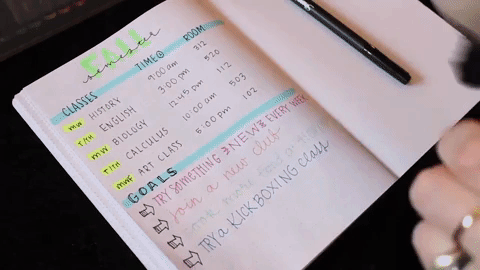When you go off to college for the first time, getting a job may be the last thing to cross your mind. Maybe at first you don’t need one, but then your dining account reaches zero and your ramen supply is depleted. You begin to think about getting a job to help get you by, but that seems like a daunting task. How in the world can you manage having a job classes alone cause you enough stress! The answer to that is simple: you’ve got to hustle for life-work balance.
Listen to all the tips and tricks to get to the gold standard of life-work balance.
1. FINDING THE PERFECT JOB

This seems like an obvious first step, but many college students make fatal mistakes here. Many factors play into finding the right job for you and your scheduling needs. Two things that you absolutely must take into consideration are travel time and flexibility. When looking for a job, look somewhere close to campus. Better yet, on campus. You won’t have to rush from class to the bus stop to make it to your shift on time, nor do you have to worry about pesky employers that won’t understand the needs of a college student. However, this also means you will need to step out of your comfort zone. Keep in mind that you are a college student, and beggars cannot be choosers. Now is not the time to be picky about what you will or will not do. Your debit/credit cards make stubborn opponents.
2. SCHEDULING THE RIGHT WAY

You must make sure to be on top of changing your availability every quarter to match your class schedule. On top of that, you better hope you requested the days of your finals off, or prepare for a world of hurt. The earlier you request this time off, the better. Managers often schedule weeks in advance, so modifying your schedule early on works better for everyone. Then figure out what days you need off to prepare for your tests and request those days off. If finances allow, schedule yourself two–three days off per week.
Never schedule your classes around your work. Always schedule classes first. I find the most success when I purposefully schedule one class several hours after the other. This large break allows for lunch, and it forces me to stay on campus where I have no choice but to do my assignments. For the rest of my day, I finish up classes and head to work knowing that all my assignments are done.
Planners are also essential to scheduling if you want to get your hustle on. “I usually use a planner where I can see my entire week,” Western Washington University third-year Esther Chong said. “I put everything in my planner: syllabi that professors give me, work schedule, events that I want to go to, utilities, etc.”
3. WORK HARD, PLAY HARD

This is something a high school teacher always used to tell me, and I’ll be darned if I said it isn’t my daily mantra. This gets me through my classes and shifts at work because I know quitting time and play time are lights at the end of the tunnel. “Give yourself something to look forward to after you are done with whatever you have to finish,” University of Washington third-year psychology student and writing tutor Aarti Bodas said. “Even if its something as small as eating that leftover donut, or finally writing something you’ve been waiting to write, keep that goal in mind.”
Need some help brainstorming? Consider doing yoga (Yoga With Adriene on YouTube), journaling (relieve your stress by writing about it), watching movies (I use Amazon Prime Student), knitting (winter is coming) or reading (self-explanatory). Go out on a limb to find new places to do homework and/or write (tea houses are my current obsession). Last, never forget to time to hang out with friends. Because who doesn’t love their friends?
“I save to travel, see shows and buy myself groceries because everyone deserves to eat well,” Chong said. “For inexpensive alternatives are usually spending a night in with my boo and roomies, going to the park, draw in my sketchbook and take a bath.”
4. KNOW YOURSELF

Everyone can make this life work. But you can only find what works best for you by understanding yourself and remaining in tune with what your body tries to tell you. “We all have limits. I need sleep and, when I don’t get it, I’m miserable, have a harder time getting to my baseline of happiness and I don’t learn as fast,” University of Washington second-year intended neuroscience major Allegra Johnson said. “Some people need sleep while other people are extremely extroverted and need social interaction every day. Whatever the case figuring out when you’re the most content in life and trying to implement those things into your life is crucial.”
When you feel yourself getting energized and reoriented, take a moment to analyze the reason behind it. Make sure to implement that into your life. Like Johnson said, if you feel at your best after a good night’s rest, make sure you incorporate a good amount of sleep into your list of good habits. If socialization makes you feel your best, make hanging out with friends one of your priorities.
On the flip side, remember to check in with yourself when you feel your worst too. Your emotions tell you a lot about yourself. As college students, we have the tendency to push them aside in the name of being productive. “Feeling emotions allows you to learn how to care for yourself,” Johnson said. “You’re having a bad day? Take it easy on yourself! Talk to a friend about it, drink some tea, wrap yourself in a blanket, go for a run, take a nap, watch some Netflix. Do whatever brings you back to your baseline of happiness. It’s not like you were gonna get any productive studying done anyways.”
I will be going on two years at my current job come February. Sheer will alone couldn’t have gotten me through it. I needed strategic planning and internal conversations with my body about its needs. Listening to both my stress and my happiness, I formed a collection of great habits that allow me to be the best student and employee that I can be. Not only that, but I was able to build a consistent environment that consistently energized me. And it allowed me to find the perfect life-work balance.



















